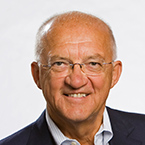
An internationally revered scientist whose research has directly affected the lives of countless patients with major chronic diseases, Dr. Ullrich is regarded as one of the fathers of biotechnology. The first of many major breakthroughs made by Dr. Ullrich occurred in the 1980s when he led efforts to create a recombinant human insulin molecule for the treatment of diabetes through the use of cutting-edge genetic cloning technologies. At the time, this was the first clinically viable drug ever created by such means. Subsequent studies involving this genetically engineered molecule demonstrated that it was structurally identical to naturally occurring insulin yet elicited faster physiological responses and caused fewer allergic reactions.
This seminal research was followed by another major breakthrough when Dr. Ullrich, along with others, developed trastuzumab, a monoclonal antibody directed towards the HER2/neu receptor, which is aberrantly overexpressed in 30% of metastatic breast cancers. This personalized therapeutic revolutionized the way in which breast cancer patients are treated and has since led to similar studies investigating the use of monoclonal antibody technology for the treatment of various cancers.
Following the establishment of trastuzumab, Dr. Ullrich sought to understand the genetic governance of tumor angiogenesis, and in doing so, discovered that inhibition of the VEGF receptor results in decreased blood vessel production, in turn resulting in decreased cancer cell growth. These findings have since led to the establishment of sunitinib, a multitargeting receptor tyrosine kinase inhibitor that received FDA approval in 2006 for the treatment of both gastrointestinal stromal tumors and renal cell carcinoma.
In addition to his work at Max Planck Institute, Dr. Ullrich has successfully formed a number of successful biotechnology companies, while also serving as principal investigator of the Singapore Oncogene Project at the Institute of Molecular and Cell Biology (IMCB).
Career Highlights
2019 Lasker-Debakey Clinical Medical Research Award
2013 Elected Member, Hungarian Academy of Sciences
2010 Wolf Prize in Medicine
2009 Federal Cross of Merit 1st Class, Order of Merit of the Federal Republic of Germany
2008 Sheikh Hamdan bin Rashid Al Maktoum Award for Medical Sciences, UAE
2008 Pezcoller Foundation-AACR International Award for Cancer Research
2007 Warren Alpert Prize
2005 Otto Warburg Medal
2005 Elected Foreign Member (hon), American Academy of Arts and Sciences
2003 King Faisal International Prize for Medicine, King Faisal Foundation
2001 Robert Koch Award, Berlin
2000 Elected Member, German National Academy of Sciences, Leopoldina
2000 AACR-Bruce F. Cain Memorial Award
1998 German Cancer Prize, German Cancer Society, Frankfurt
1991 Prix Antoine Lacassagne, Ligue Nationale Française Contre le Cancer, Paris
1975 PhD, University of Heidelberg